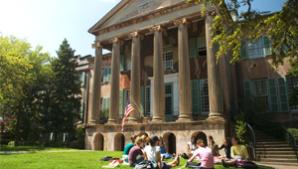About Us Menu
Faith in the Campus Conversation

Universities exist to find what is true, to encourage vibrant discourse, and to nurture students. InterVarsity Christian Fellowship, with its 70-year history of campus ministry, welcomes the opportunity to be involved with all of the increasingly diverse communities on campus. But diversity has also become a political football that complicates the work of campus ministry, particularly when nondiscrimination policies conflict with religious freedom principles.
Last year InterVarsity President Alec Hill was a member of a task force that assembled a white paper called Principled Pluralism for the Aspen Institute. The white paper’s aim was to “increase respect for diverse religious identities in the public sphere, foster positive interfaith interactions, and form productive partnerships among people of different faiths in the service of the common good.”
In a panel discussion at Calvin College, cosponsored by InterVarsity and the Aspen Institute, Alec said, “We have 900 chapters in InterVarsity and we're facing a lot of issues on campus relating to the secular/religious divide, less so the religious/religious divide. For me this issue of finding people who have common values and spirit, of different faiths but who see the issues we're struggling with, would be helpful. ”
Agreeable Disagreements
Alec recalled that after 9/11 the InterVarsity chapter at Wayne State University reached out to the beleaguered Muslim students on campus to befriend them. The Boston Globe reported on how much both sides valued the regular meetings. "Yeah we meet every month, we talk about what we believe, we try to convert each other, and we're friends," quipped one of the interviewees.
“That’s principled pluralism,” Alec said. “You may not agree, but you accept each other. You love each other, and you have that kind of dialogue and conversation, fully holding on to what you believe, fully articulating that."
Alec noted that the meaning of tolerance has changed. It used to mean respect between those who disagreed with each other. Today it means those who disagree need to change their beliefs until they reach the lowest common denominator, and convictions have become valueless.
“On campus tolerance is actually thrown in our face and it becomes anti-tolerance toward people who hold strong religious convictions,” Alec said. “It's a paradox and irony, a Nineteen Eighty Four use of the word.”
Helping Students
Joining Alec in the panel discussion on pluralism was Calvin College President Michael Le Roy, who agreed on the importance of respecting differences. "It's a mark of maturity when somebody can have their convictions and engage someone who is different, not compromising those convictions but listening and then responding in kindness and gentleness," he said. "These are the skills that we need to help students to develop."
The Rev. Julius Medenblik, president of Calvin Theological Seminary and the other member of the panel, noted that the participation of the Christian church in society was not always consistent down through history, but at many times the church has provided much-needed compassionate service and at other times bold leadership at critical times. “If we do not stand up [for what we believe in], what happens to our culture?” he asked.
The Genius of America
The distaste for discrimination and the desire for freedom are strong themes in American history and have been protected by the First Amendment to our Constitution. But that landscape seems to be changing and the change is perhaps most evident on U.S. college campuses right now.
“In the name of anti-discrimination, in the name of pluralism, in the name of tolerance, the opposite is happening," Alec said. "It seems to me it's the genius of America that we were many and yet one, and we allowed space for those differences. I fear that's under attack."
By advocating for principled pluralism, in partnership with the Aspen Institute and other organizations, InterVarsity is working to make sure U.S. college and university campuses maintain the ideals of their (often Christian) founders.
For further information:
Listen to the panel discussion Time: 1:26:30
Principled Pluralism White Paper
Photo: copyright 2014 photography by Ellen Alderink
On April 29, 2014, another panel discussion in this series was held at the Billy Graham Center in Wheaton, Illinois. On this panel, Alec Hill was joined by Dr. Philip Rykind, president of Wheaton College, and Dr. S. Alan Ray, president of Elmhurst College. A video of the panel discussion can be viewed here.